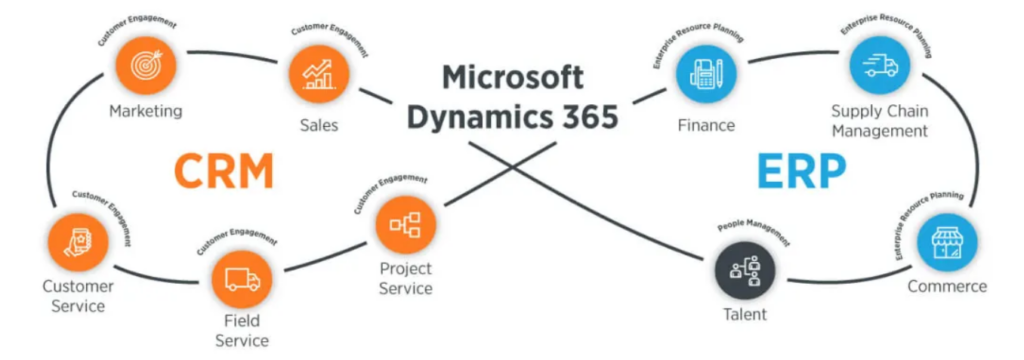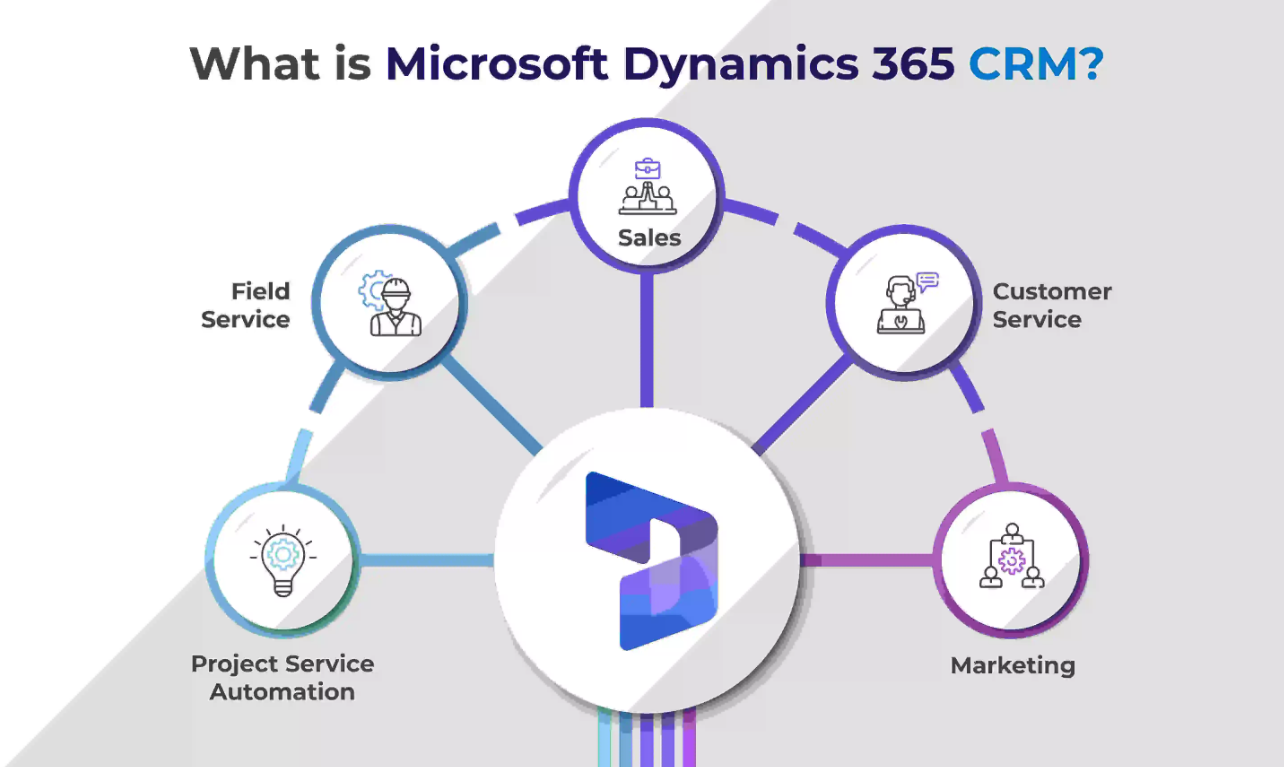In the rapidly evolving landscape of enterprise software, Microsoft Dynamics 365 stands out as a comprehensive suite of business applications that seamlessly integrates Enterprise Resource Planning (ERP) and Customer Relationship Management (CRM) functionalities. This cloud-based platform offers a unified solution for organizations seeking to streamline their operations, enhance customer engagement, and drive digital transformation. This article delves into the intricacies of Microsoft Dynamics 365, exploring its key components, benefits, and impact on modern business practices.
Understanding Microsoft Dynamics 365

Microsoft Dynamics 365 is a cloud-based business applications platform that combines ERP and CRM capabilities into a single, coherent ecosystem. Launched in 2016, it represents the culmination of Microsoft’s longstanding experience in business software development, incorporating elements from its previous Dynamics AX, NAV, GP, and CRM products. The platform is designed to be modular and scalable, allowing businesses to select and implement only the applications they need, with the flexibility to add more as their requirements evolve.
At its core, Dynamics 365 aims to break down the traditional silos between different business functions, providing a unified view of operations, finances, and customer interactions. This integration enables organizations to make data-driven decisions, improve operational efficiency, and deliver exceptional customer experiences.
Key Components of Dynamics 365
Dynamics 365 comprises several interconnected applications, each focusing on specific business functions. The main components include:
- Finance: Provides comprehensive financial management capabilities, including general ledger, accounts payable and receivable, and financial reporting.
- Supply Chain Management: Offers tools for managing supply chain operations, including procurement, inventory, and logistics.
- Sales: A robust CRM application that helps sales teams manage leads, opportunities, and customer relationships.
- Marketing: Enables the creation and execution of multi-channel marketing campaigns, with features for lead scoring, email marketing, and event management.
- Customer Service: Supports customer service operations with case management, knowledge bases, and omnichannel support capabilities.
- Human Resources: Provides tools for HR management, including employee onboarding, performance management, and benefits administration.
- Field Service: Supports organizations in managing and optimizing field service operations, including scheduling, dispatch, and mobile workforce management.
These applications can be deployed individually or in combination, depending on the organization’s needs. They are designed to work seamlessly together, sharing data and providing a unified user experience across the platform.
Integration and Extensibility
One of the key strengths of Microsoft Dynamics 365 is its deep integration with other Microsoft products and services. This integration extends to:
- Microsoft 365 (formerly Office 365): Seamless interaction with familiar productivity tools like Outlook, Excel, and SharePoint.
- Power Platform: Integration with Power BI for advanced analytics, Power Apps for custom application development, and Power Automate for workflow automation.
- Azure: Leveraging Azure’s cloud infrastructure for scalability, security, and advanced services like AI and machine learning.
Furthermore, Dynamics 365 offers extensive customization and extensibility options. Organizations can tailor the applications to their specific needs through configuration, custom development, and third-party add-ons available through the AppSource marketplace. This flexibility allows businesses to create a truly bespoke solution that aligns perfectly with their unique processes and requirements.
ERP Capabilities: Streamlining Business Operations
The ERP components of Dynamics 365, primarily Finance and Supply Chain Management, offer robust capabilities for managing core business operations:
- Financial Management: Comprehensive tools for managing financial transactions, budgeting, and reporting. The system provides real-time financial insights and supports multi-currency and multi-entity operations.
- Supply Chain Optimization: Advanced features for demand forecasting, inventory management, and procurement. The platform leverages AI and machine learning to optimize supply chain operations and improve efficiency.
- Production Planning: Tools for managing manufacturing processes, including production scheduling, bill of materials management, and quality control.
- Project Management: Integrated project management capabilities that allow organizations to plan, execute, and track projects, including resource allocation and financial management.
These ERP functionalities provide organizations with a holistic view of their operations, enabling better decision-making and improved operational efficiency. The cloud-based nature of Dynamics 365 ensures that businesses always have access to the latest features and can scale their operations seamlessly as they grow.
CRM Capabilities: Enhancing Customer Engagement
The CRM components of Dynamics 365, including Sales, Marketing, and Customer Service, offer powerful tools for managing customer relationships throughout the entire customer lifecycle:
- Sales Automation: Comprehensive tools for lead and opportunity management, sales forecasting, and performance tracking. The system leverages AI to provide sales insights and next-best-action recommendations.
- Marketing Automation: Sophisticated marketing capabilities, including customer segmentation, multi-channel campaign management, and marketing analytics. The platform supports personalized marketing efforts and provides tools for measuring campaign effectiveness.
- Customer Service Management: Robust case management features, knowledge bases, and omnichannel support capabilities. The system leverages AI to provide intelligent routing and suggestions for customer service representatives.
- Customer Insights: Advanced analytics capabilities that provide a 360-degree view of customers, leveraging data from across the organization to deliver personalized experiences and identify new opportunities.
These CRM functionalities enable organizations to deliver exceptional customer experiences, drive customer loyalty, and identify new revenue opportunities. The integration between CRM and ERP components ensures that customer-facing teams have access to relevant operational data, enabling them to provide more informed and personalized service.
Artificial Intelligence and Advanced Analytics
A key differentiator of Microsoft Dynamics 365 is its extensive use of artificial intelligence and advanced analytics throughout the platform. These capabilities are powered by Azure AI and are seamlessly integrated into various applications:
- Predictive Analytics: AI-driven insights that help organizations forecast demand, predict customer behavior, and identify potential issues before they occur.
- Intelligent Automation: AI-powered tools that automate routine tasks, such as data entry and invoice processing, freeing up employees to focus on higher-value activities.
- Natural Language Processing: AI capabilities that enable natural language interactions, such as chatbots for customer service and voice-driven interfaces for data entry and retrieval.
- Computer Vision: AI-powered image recognition capabilities that can be used for tasks such as product identification and quality control in manufacturing processes.
These AI and analytics capabilities enable organizations to gain deeper insights from their data, make more informed decisions, and deliver more personalized experiences to their customers. As Microsoft continues to invest in AI research and development, the AI capabilities of Dynamics 365 are expected to become even more sophisticated and pervasive throughout the platform.
Implementation and Adoption Considerations
While Microsoft Dynamics 365 offers powerful capabilities, successful implementation and adoption require careful planning and execution. Organizations considering Dynamics 365 should take into account the following factors:
- Business Process Alignment: Conducting a thorough analysis of existing business processes and identifying areas for improvement or redesign to align with Dynamics 365 best practices.
- Data Migration: Developing a comprehensive strategy for migrating data from legacy systems to Dynamics 365, ensuring data quality and integrity throughout the process.
- User Training: Investing in comprehensive training programs to ensure users are comfortable with the new system and can leverage its full capabilities.
- Change Management: Implementing effective change management strategies to address potential resistance and ensure smooth adoption across the organization.
- Customization and Integration: Carefully planning any customizations or integrations with other systems to ensure they align with long-term business objectives and do not impede future upgrades.
- Ongoing Support and Optimization: Establishing processes for ongoing support, maintenance, and optimization of the Dynamics 365 environment to ensure it continues to meet evolving business needs.
By addressing these considerations, organizations can maximize the value of their Dynamics 365 implementation and realize the full potential of the platform.
In conclusion, Microsoft Dynamics 365 represents a powerful and flexible solution for organizations seeking to integrate their ERP and CRM capabilities. By providing a unified platform for managing business operations and customer relationships, enhanced by AI and advanced analytics, Dynamics 365 enables organizations to drive digital transformation, improve operational efficiency, and deliver exceptional customer experiences. As the business landscape continues to evolve, the modular and scalable nature of Dynamics 365 positions it as a future-proof solution capable of adapting to changing business needs and technological advancements.

